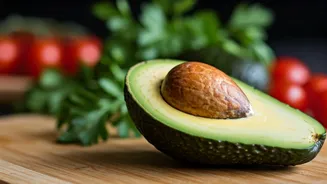The Longevity Connection
The journey toward a longer and healthier life often begins with the foods we consume. Incorporating specific items into your daily meal plans can significantly
impact overall well-being and longevity. This is the rationale behind focusing on six foods renowned for their health-promoting properties. These foods are not just ordinary ingredients; they are nutritional powerhouses backed by scientific research, each playing a unique role in supporting different aspects of health. From their impact on heart health to their ability to fight off disease, each of these foods provides a valuable contribution to a comprehensive approach to a long life. The key is understanding how to integrate these items into your daily routine to maximize the benefits. It is also important to remember that a balanced diet, combined with regular exercise and a healthy lifestyle, is the most effective approach to longevity.
Peas: Nutritional Powerhouse
Peas, often overlooked, are a fantastic addition to any diet. They are not merely a side dish; they bring a wealth of essential nutrients, including vitamins, minerals, and antioxidants, to the table. Beyond their basic nutritional profile, peas are rich in fiber, which aids digestion and promotes a feeling of fullness, potentially assisting in weight management. Regular consumption of peas has been linked to several health benefits, such as improved heart health and reduced risk of chronic diseases. Peas are versatile. They can be added to soups, salads, and stews, or eaten on their own. Their ease of inclusion makes them a convenient way to boost your nutritional intake. By recognizing peas as more than just a vegetable, you can elevate your diet with this nutritious and accessible food.
Lentils: Heart-Healthy Choice
Lentils are renowned for their positive effects on heart health. They are packed with soluble fiber, which helps reduce cholesterol levels and promotes overall cardiovascular well-being. Additionally, lentils are an excellent source of plant-based protein, which is essential for muscle health and overall body function. They are also rich in iron, vital for transporting oxygen throughout the body. Their nutritional density makes lentils a valuable component of a balanced diet. Whether used in soups, stews, or salads, lentils are a versatile and accessible food. The regular intake of lentils can contribute to lowering the risks of heart disease and supporting a healthy lifestyle. Making lentils a regular component of your diet can be a proactive step towards cardiovascular health and longevity.
Berries: Antioxidant Boost
Berries, with their vibrant colors and delightful flavors, are nutritional champions, celebrated for their antioxidant properties. These compounds fight against the free radicals that can cause cellular damage and contribute to the aging process and various diseases. The consumption of berries can protect against oxidative stress and support healthy cellular function. Berries also contain essential vitamins and minerals, adding to their value. Their fiber content also supports digestive health. Berries are versatile, easy to incorporate into daily meals, and offer a natural sweetness that satisfies cravings. Eating berries regularly can contribute to improved overall health. From blueberries to strawberries, including these vibrant fruits in your diet is a flavorful and effective way to promote well-being.
Nuts: Healthy Fats
Nuts are a delicious and beneficial addition to your diet. They are a rich source of healthy fats, protein, and essential nutrients that support cardiovascular health and brain function. The monounsaturated and polyunsaturated fats found in nuts are known for reducing bad cholesterol levels. They also provide fiber, which aids in digestion and helps in maintaining a healthy weight. Nuts are packed with vitamins and minerals, including vitamin E and magnesium, which contribute to overall health. Adding a handful of nuts to your diet can provide a convenient and nutritious snack, promoting satiety and supporting long-term well-being. A variety of nuts, from almonds to walnuts, offers diverse flavors and nutrient profiles, making them a flexible and enjoyable addition to your daily meals.
Olive Oil: Culinary Staple
Olive oil is a cornerstone of the Mediterranean diet and has been linked to numerous health benefits. Rich in monounsaturated fats and antioxidants, it supports heart health and reduces inflammation. Extra virgin olive oil, in particular, is known for its high concentration of beneficial compounds. This versatile oil is not only great for cooking but also adds flavor to dishes. Olive oil can play a major role in your diet, contributing to a longer life. Research consistently highlights the positive impact of olive oil on cardiovascular health and overall well-being. From drizzling it on salads to using it in cooking, olive oil offers a simple yet potent way to improve your health. Making olive oil a regular part of your diet is a step towards a healthier lifestyle and longevity.
















